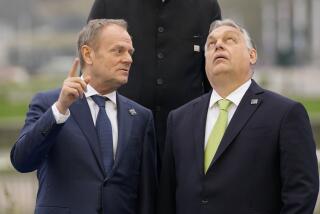Baker Battles Poland’s Sense of Deja Vu : Reunification: He spends seven hours trying to convince leaders that a united Germany will not pose a threat.
- Share via
WARSAW — The theme in Poland this week is deja vu. Secretary of State James A. Baker III spent about seven hours here Sunday trying to overcome the jitters of Polish leaders over the thought that German reunification could mean a repeat of the history of World War II.
“The issue is a very emotional one with the Polish people,” a top-level State Department official told reporters aboard Baker’s aircraft on the way home from Warsaw.
Officially, the Polish government is demanding assurances that a united Germany will not try to change the postwar border between the two countries. But the official said the concern goes far deeper than that.
“It is not a pure border question,” the official said. “It is a fear that history might repeat itself. They want to do everything they can to prevent that.”
Baker visited Warsaw after completing the first meeting Saturday in Bonn of the so-called two-plus-four talks among the two German states and the four main World War II victors, the United States, the Soviet Union, Britain and France.
He delivered to Prime Minister Tadeusz Mazowiecki a letter inviting Poland to send its prime minister to a two-plus-four meeting in Paris in July, when border questions will be considered.
“I think they were very pleased to receive the letter,” Baker said. “I think they were somewhat reassured by our account of the discussion that took place in Bonn.”
In addition to Mazowiecki, Baker met separately with Foreign Minister Krzysztof Skubiszewski, President Wojciech Jaruzelski and Solidarity leader Lech Walesa.
About 44,000 square miles of land that was part of Germany before World War II was ceded to Poland after the conflict, primarily to compensate for Polish territory annexed by the Soviet Union.
Leaders of both West Germany and East Germany have promised to support the present border. But they maintain that a border treaty can be negotiated only after Germany becomes a single state. Poland has proposed drafting a treaty now that could be initialed by both German governments but not signed until later.
But it was clear that Poland’s primary fear is that important matters affecting Germany on its western border and Lithuania on its northeast will be decided without consideration of Poland’s interests.
With Baker at his side, Walesa complained that a small group of nations--clearly a reference to the two-plus-four process--are discussing matters that have an impact on the entire Continent.
“All European states should take responsibility for peace and stability in Europe,” he said.
A senior State Department official said the history of Poland “is not a happy one.”
“The order of Europe and the peace of Europe are being changed,” the official said. “This has happened sometimes in the past, with Poland becoming the victim of it.”
More to Read
Get the L.A. Times Politics newsletter
Deeply reported insights into legislation, politics and policy from Sacramento, Washington and beyond. In your inbox twice per week.
You may occasionally receive promotional content from the Los Angeles Times.










